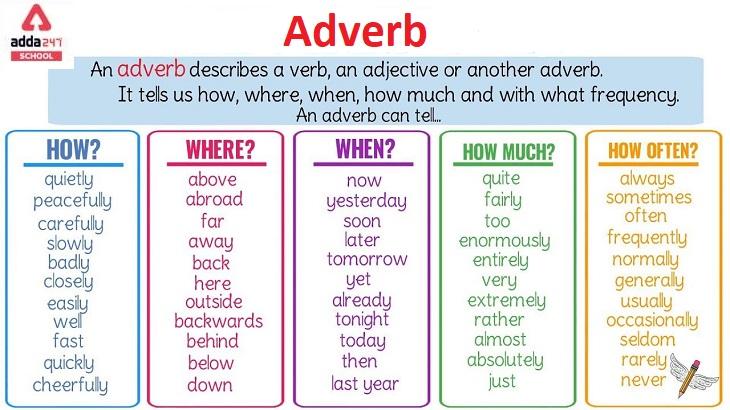Table of Contents
Adverb Definition
Adverbs are words or expressions that modify a verb, adjective, another adverb, determiner, clause, preposition, or phrase to communicate things like manner, place, time, frequency, degree, level of certainty, and so on. How? in what way? when? where? and to what extent? are all questions that adverbs answer. The adverbial function is the name given to this specific function of adverbs. Single adverbs, multi-word adverbial phrases, and adverbial clauses can all execute adverbial functions.
Modern linguists point out that the term “adverb” has come to be employed as a kind of “catch-all” category, used to identify words with diverse types of syntactic activity and thus, they don’t necessarily have much in common other than the fact that they don’t fit into any of the other categories.
Definition of Adverb in Simple Words
An adverb is a word or phrase that modifies or qualifies an adjective, verb, or other adverb, expressing a relation of place, time, circumstance, manner, cause, degree, etc. Examples of adverbs include: quickly, slowly, here, there, now, then, very, extremely, and almost.
What is Adverb?
An adverb is a part of speech that modifies or describes verbs, adjectives, or other adverbs. It provides more information about how, when, where, or to what extent an action is performed. Adverbs can express qualities such as time, place, manner, degree, frequency, or purpose. They can answer questions like “How?” “When?” “Where?” and “To what extent?”
For example:
- She sings beautifully. (The adverb “beautifully” describes how she sings.)
- They arrived late. (The adverb “late” describes when they arrived.)
- He works diligently. (The adverb “diligently” describes how he works.)
- The cat is very small. (The adverb “very” describes the degree of smallness.)
Adverbs can be formed by adding the suffix “-ly” to adjectives, such as “quickly” from “quick,” but not all adverbs end in “-ly.” Some adverbs, like “now,” “here,” or “often,” do not follow this pattern. Adverbs are versatile and play an important role in providing additional details and enhancing the meaning of a sentence.
Adverb Meaning
Adverb Meaning: An adverb is a part of speech that describes or modifies a verb, adjective, or another adverb. It provides additional information about how, when, where, or to what extent an action is performed. In simple words, an adverb is a word that tells us more about how something happens. For example, in the sentence “She ran quickly,” the word “quickly” is an adverb because it describes how she ran. It gives us more information about the action of running.
Read: Pronoun
Adverb Definition with Examples
An adverb is a part of speech that modifies or qualifies a verb, an adjective, another adverb, a clause, or a sentence. Adverbs typically answer questions such as how, when, where, and to what extent.
Examples: She quickly finished the exam. (The adverb quickly modifies the verb finished, answering the question of how she finished the exam.)
He drove carefully on the icy road. (The adverb carefully modifies the verb drove, answering the question of how he drove on the icy road.)
Adverb Examples
1. Quickly 2. Silently 3. Gently 4. Bravely 5. Carefully 6. Arrogantly 7. Slyly 8. Jovially 9. Loudly 10. Powerfully
List of Adverb Examples in Sentences
1. She sings beautifully and melodiously.
2. He ran swiftly across the field.
3. I will work diligently to get the job done.
4. She spoke softly to the baby.
5. He spoke candidly about the situation.
6. She moves gracefully across the dance floor.
7. She reads fluently in three languages.
8. He answered politely to everyone.
9. She drives carefully down the street.
10. He worked extremely hard to finish the project.
Adverb Types
Adverbs come in a number of different forms. The majority of the time, adverbs are distinguished by the type of information they convey.
Adverb Types
The six most common types of adverbs are as follows:
Read: Parts of Speech
Conjunctive adverbs
In sentences, conjunctive adverbs perform an important grammatical role. A conjunctive adverb is an adverb that functions similarly to conjunction. A conjunctive adverb is a word that joins two clauses or sentences. We can also use a semicolon instead of a full stop when using conjunctive adverbs.
Adverbs of frequency
Adverbs of frequency are a group of adverbs that are used to characterise the frequency of an event. With the help of, constantly, frequently, occasionally, sometimes, generally, never, always, seldom, daily, weekly, monthly, yearly, etc., these Adverbs of frequency express how often something happens.
Adverbs of time
Time adverbs inform us when something occurs. Today, yesterday, tomorrow, tonight, soon, later, and other adverbs of time refer to specific moments and more generic time periods, such as today, yesterday, tomorrow, tonight, soon, later, and so on.
Adverbs of manner
Adverbs of manner describe how something happens, and this category includes a large variety of adverbs. Many adverbs ending in -ly, such as violently, warily, hungrily, pleasantly, slowly, neatly, exactly, unknowingly, loudly, and so on, belong to this category.
Adverbs of degree
Adverbs of degree, such as really, very, astonishingly, too, quite, barely, deeply, pretty, substantially, hardly, highly, intensely, somewhat, utterly, little, less, least, much, more, most, etc., are commonly employed as intensifiers to characterise adjectives and other adverbs.
Adverbs of place
With phrases like here, there, everywhere, nowhere, someplace, anyplace, in, out, inside, outside, wherever, on, off, over, under, away, left, right, north, etc., adverbs of location inform us where something happens.
Read: Figure of Speech
Adverb ki Definition in Hindi (Adverb ki Meaning)
क्रियाविशेषण ऐसे शब्द या भाव हैं जो क्रिया, विशेषण, अन्य क्रिया विशेषण, निर्धारक, उपवाक्य, पूर्वसर्ग, या वाक्यांश को संशोधित करते हैं ताकि तरीके, स्थान, समय, आवृत्ति, डिग्री, निश्चितता का स्तर, और इसी तरह की चीजों को संप्रेषित किया जा सके। कैसे? किस तरह से? कब? कहाँ पे? और किस हद तक? वे सभी प्रश्न हैं जिनका क्रिया विशेषण उत्तर देता है। क्रिया विशेषण क्रिया क्रिया विशेषण के इस विशिष्ट कार्य को दिया गया नाम है। एकल क्रियाविशेषण, बहु-शब्द क्रियाविशेषण वाक्यांश, और क्रिया विशेषण खंड सभी क्रिया विशेषण कार्य निष्पादित कर सकते हैं।
आधुनिक भाषाविदों का कहना है कि शब्द “क्रिया विशेषण” को एक प्रकार की “कैच-ऑल” श्रेणी के रूप में नियोजित किया गया है, जिसका उपयोग विभिन्न प्रकार की वाक्यात्मक गतिविधि वाले शब्दों की पहचान करने के लिए किया जाता है और इस प्रकार, उनके अलावा अन्य में जरूरी नहीं है। तथ्य यह है कि वे किसी भी अन्य श्रेणी में फिट नहीं होते हैं।
Read: Women Empowerment
Read: Air Pollution
Adverb Meaning in Tamil
The term “adverb” is called “வினையூசி” (Vinaiyūci) in Tamil. Adverbs are words that modify verbs, adjectives, or other adverbs to provide more context or information. They often describe how, when, where, or to what extent an action is performed.
For example:
- He runs quickly. (“Quickly” is an adverb modifying the verb “runs.”)
- She is very smart. (“Very” is an adverb modifying the adjective “smart.”)
In Tamil, adverbs function in much the same way. They are used to give more detail to verbs, adjectives, or other adverbs.
Example in Tamil:
- அவன் வேகமாக ஓடுகிறான் (Avan vēkamāka ōṭukirāṉ) – Here “வேகமாக” (vēkamāka) is an adverb modifying the verb “ஓடுகிறான்” (ōṭukirāṉ), meaning “He runs quickly.”
I hope this helps you understand the meaning and function of adverbs in Tamil!



 Most Repeated Questions from Class 10 En...
Most Repeated Questions from Class 10 En...
 Republic Day Speech In English 2025, 26 ...
Republic Day Speech In English 2025, 26 ...
 500+ Antonyms Words List for Kids, Downl...
500+ Antonyms Words List for Kids, Downl...










